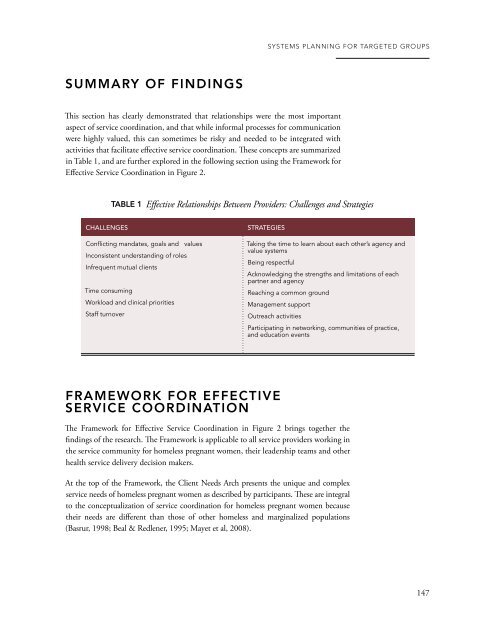- Page 1 and 2:
Edited by Naomi NICHOLS & Carey DOB
- Page 3 and 4:
© 2016 The Homeless Hub ISBN 978-1
- Page 5 and 6:
CONTENTS INTRODUCTION — Carey Dob
- Page 7 and 8:
3.7 I’ll Tell You What I Want, Wh
- Page 9 and 10:
INTRODUCTION policy ought to be a m
- Page 11 and 12:
INTRODUCTION PROGRAM AND SERVICE-LE
- Page 13 and 14:
INTRODUCTION INTER-SECTORAL COLLABO
- Page 15 and 16:
INTRODUCTION REFERENCES Allen, C. &
- Page 17 and 18:
1.0 Program and Service-level Colla
- Page 19 and 20:
PROGRAM AND SERVICE-LEVEL COLLABORA
- Page 21 and 22:
PROGRAM AND SERVICE-LEVEL COLLABORA
- Page 23 and 24:
PROGRAM AND SERVICE-LEVEL COLLABORA
- Page 25 and 26:
PROGRAM AND SERVICE-LEVEL COLLABORA
- Page 27 and 28:
PROGRAM AND SERVICE-LEVEL COLLABORA
- Page 29 and 30:
PROGRAM AND SERVICE-LEVEL COLLABORA
- Page 31 and 32:
PROGRAM AND SERVICE-LEVEL COLLABORA
- Page 33 and 34:
PROGRAM AND SERVICE-LEVEL COLLABORA
- Page 35 and 36:
PROGRAM AND SERVICE-LEVEL COLLABORA
- Page 37 and 38:
PROGRAM AND SERVICE-LEVEL COLLABORA
- Page 39 and 40:
PROGRAM AND SERVICE-LEVEL COLLABORA
- Page 41 and 42:
PROGRAM AND SERVICE-LEVEL COLLABORA
- Page 43 and 44:
PROGRAM AND SERVICE-LEVEL COLLABORA
- Page 45 and 46:
PROGRAM AND SERVICE-LEVEL COLLABORA
- Page 47 and 48:
PROGRAM AND SERVICE-LEVEL COLLABORA
- Page 49 and 50:
PROGRAM AND SERVICE-LEVEL COLLABORA
- Page 51 and 52:
PROGRAM AND SERVICE-LEVEL COLLABORA
- Page 53 and 54:
Program and Service-level Collabora
- Page 55 and 56:
PROGRAM AND SERVICE-LEVEL COLLABORA
- Page 57 and 58:
PROGRAM AND SERVICE-LEVEL COLLABORA
- Page 59 and 60:
PROGRAM AND SERVICE-LEVEL COLLABORA
- Page 61 and 62:
PROGRAM AND SERVICE-LEVEL COLLABORA
- Page 63 and 64:
PROGRAM AND SERVICE-LEVEL COLLABORA
- Page 65 and 66:
PROGRAM AND SERVICE-LEVEL COLLABORA
- Page 67 and 68:
PROGRAM AND SERVICE-LEVEL COLLABORA
- Page 69 and 70:
PROGRAM AND SERVICE-LEVEL COLLABORA
- Page 71 and 72:
PROGRAM AND SERVICE-LEVEL COLLABORA
- Page 73 and 74:
PROGRAM AND SERVICE-LEVEL COLLABORA
- Page 75 and 76:
Program and Service-level Collabora
- Page 77 and 78:
PROGRAM AND SERVICE-LEVEL COLLABORA
- Page 79 and 80:
PROGRAM AND SERVICE-LEVEL COLLABORA
- Page 81 and 82:
PROGRAM AND SERVICE-LEVEL COLLABORA
- Page 83 and 84:
PROGRAM AND SERVICE-LEVEL COLLABORA
- Page 85 and 86:
PROGRAM AND SERVICE-LEVEL COLLABORA
- Page 87 and 88:
PROGRAM AND SERVICE-LEVEL COLLABORA
- Page 89 and 90:
PROGRAM AND SERVICE-LEVEL COLLABORA
- Page 91 and 92:
Program and Service-level Collabora
- Page 93 and 94:
PROGRAM AND SERVICE-LEVEL COLLABORA
- Page 95 and 96:
PROGRAM AND SERVICE-LEVEL COLLABORA
- Page 97 and 98: PROGRAM AND SERVICE-LEVEL COLLABORA
- Page 99 and 100: PROGRAM AND SERVICE-LEVEL COLLABORA
- Page 101 and 102: Orange = PMS 152 Grey = PMS Cool Gr
- Page 103 and 104: PROGRAM AND SERVICE-LEVEL COLLABORA
- Page 105 and 106: Program and Service-level Collabora
- Page 107 and 108: PROGRAM AND SERVICE-LEVEL COLLABORA
- Page 109 and 110: PROGRAM AND SERVICE-LEVEL COLLABORA
- Page 111 and 112: PROGRAM AND SERVICE-LEVEL COLLABORA
- Page 113 and 114: PROGRAM AND SERVICE-LEVEL COLLABORA
- Page 115 and 116: Systems Planning for Targeted Group
- Page 117 and 118: SYSTEMS PLANNING FOR TARGETED GROUP
- Page 119 and 120: SYSTEMS PLANNING FOR TARGETED GROUP
- Page 121 and 122: SYSTEMS PLANNING FOR TARGETED GROUP
- Page 123 and 124: SYSTEMS PLANNING FOR TARGETED GROUP
- Page 125 and 126: SYSTEMS PLANNING FOR TARGETED GROUP
- Page 127 and 128: SYSTEMS PLANNING FOR TARGETED GROUP
- Page 129 and 130: SYSTEMS PLANNING FOR TARGETED GROUP
- Page 131 and 132: SYSTEMS PLANNING FOR TARGETED GROUP
- Page 133 and 134: Systems Planning for Targeted Group
- Page 135 and 136: SYSTEMS PLANNING FOR TARGETED GROUP
- Page 137 and 138: SYSTEMS PLANNING FOR TARGETED GROUP
- Page 139 and 140: SYSTEMS PLANNING FOR TARGETED GROUP
- Page 141 and 142: SYSTEMS PLANNING FOR TARGETED GROUP
- Page 143 and 144: SYSTEMS PLANNING FOR TARGETED GROUP
- Page 145 and 146: SYSTEMS PLANNING FOR TARGETED GROUP
- Page 147: SYSTEMS PLANNING FOR TARGETED GROUP
- Page 151 and 152: SYSTEMS PLANNING FOR TARGETED GROUP
- Page 153 and 154: SYSTEMS PLANNING FOR TARGETED GROUP
- Page 155 and 156: SYSTEMS PLANNING FOR TARGETED GROUP
- Page 157 and 158: SYSTEMS PLANNING FOR TARGETED GROUP
- Page 159 and 160: SYSTEMS PLANNING FOR TARGETED GROUP
- Page 161 and 162: SYSTEMS PLANNING FOR TARGETED GROUP
- Page 163 and 164: SYSTEMS PLANNING FOR TARGETED GROUP
- Page 165 and 166: SYSTEMS PLANNING FOR TARGETED GROUP
- Page 167 and 168: SYSTEMS PLANNING FOR TARGETED GROUP
- Page 169 and 170: SYSTEMS PLANNING FOR TARGETED GROUP
- Page 171 and 172: SYSTEMS PLANNING FOR TARGETED GROUP
- Page 173 and 174: SYSTEMS PLANNING FOR TARGETED GROUP
- Page 175 and 176: SYSTEMS PLANNING FOR TARGETED GROUP
- Page 177 and 178: SYSTEMS PLANNING FOR TARGETED GROUP
- Page 179 and 180: SYSTEMS PLANNING FOR TARGETED GROUP
- Page 181 and 182: SYSTEMS PLANNING FOR TARGETED GROUP
- Page 183 and 184: Systems Planning for Targeted Group
- Page 185 and 186: SYSTEMS PLANNING FOR TARGETED GROUP
- Page 187 and 188: SYSTEMS PLANNING FOR TARGETED GROUP
- Page 189 and 190: SYSTEMS PLANNING FOR TARGETED GROUP
- Page 191 and 192: SYSTEMS PLANNING FOR TARGETED GROUP
- Page 193 and 194: SYSTEMS PLANNING FOR TARGETED GROUP
- Page 195 and 196: SYSTEMS PLANNING FOR TARGETED GROUP
- Page 197 and 198: SYSTEMS PLANNING FOR TARGETED GROUP
- Page 199 and 200:
SYSTEMS PLANNING FOR TARGETED GROUP
- Page 201 and 202:
SYSTEMS PLANNING FOR TARGETED GROUP
- Page 203 and 204:
Systems Planning for Targeted Group
- Page 205 and 206:
SYSTEMS PLANNING FOR TARGETED GROUP
- Page 207 and 208:
SYSTEMS PLANNING FOR TARGETED GROUP
- Page 209 and 210:
SYSTEMS PLANNING FOR TARGETED GROUP
- Page 211 and 212:
SYSTEMS PLANNING FOR TARGETED GROUP
- Page 213 and 214:
SYSTEMS PLANNING FOR TARGETED GROUP
- Page 215 and 216:
SYSTEMS PLANNING FOR TARGETED GROUP
- Page 217 and 218:
SYSTEMS PLANNING FOR TARGETED GROUP
- Page 219 and 220:
SYSTEMS PLANNING FOR TARGETED GROUP
- Page 221 and 222:
SYSTEMS PLANNING FOR TARGETED GROUP
- Page 223 and 224:
SYSTEMS PLANNING FOR TARGETED GROUP
- Page 225 and 226:
SYSTEMS PLANNING FOR TARGETED GROUP
- Page 227 and 228:
SYSTEMS PLANNING FOR TARGETED GROUP
- Page 229 and 230:
SYSTEMS PLANNING FOR TARGETED GROUP
- Page 231 and 232:
SYSTEMS PLANNING FOR TARGETED GROUP
- Page 233 and 234:
SYSTEMS PLANNING FOR TARGETED GROUP
- Page 235 and 236:
SYSTEMS PLANNING FOR TARGETED GROUP
- Page 237 and 238:
SYSTEMS PLANNING FOR TARGETED GROUP
- Page 239 and 240:
SYSTEMS PLANNING FOR TARGETED GROUP
- Page 241 and 242:
3.0 Inter-sectoral Collaborations
- Page 243 and 244:
INTER-SECTORAL COLLABORATIONS THE L
- Page 245 and 246:
INTER-SECTORAL COLLABORATIONS The s
- Page 247 and 248:
INTER-SECTORAL COLLABORATIONS YOUTH
- Page 249 and 250:
INTER-SECTORAL COLLABORATIONS Child
- Page 251 and 252:
INTER-SECTORAL COLLABORATIONS The m
- Page 253 and 254:
INTER-SECTORAL COLLABORATIONS CONCL
- Page 255 and 256:
INTER-SECTORAL COLLABORATIONS Munso
- Page 257 and 258:
INTER-SECTORAL COLLABORATIONS as we
- Page 259 and 260:
INTER-SECTORAL COLLABORATIONS the f
- Page 261 and 262:
INTER-SECTORAL COLLABORATIONS Quest
- Page 263 and 264:
INTER-SECTORAL COLLABORATIONS RESEA
- Page 265 and 266:
INTER-SECTORAL COLLABORATIONS TABLE
- Page 267 and 268:
INTER-SECTORAL COLLABORATIONS TABLE
- Page 269 and 270:
INTER-SECTORAL COLLABORATIONS TABLE
- Page 271 and 272:
INTER-SECTORAL COLLABORATIONS TABLE
- Page 273 and 274:
INTER-SECTORAL COLLABORATIONS RESUL
- Page 275 and 276:
INTER-SECTORAL COLLABORATIONS focus
- Page 277 and 278:
INTER-SECTORAL COLLABORATIONS 2009
- Page 279 and 280:
INTER-SECTORAL COLLABORATIONS defic
- Page 281 and 282:
INTER-SECTORAL COLLABORATIONS Housi
- Page 283 and 284:
INTER-SECTORAL COLLABORATIONS Recom
- Page 285 and 286:
INTER-SECTORAL COLLABORATIONS Homew
- Page 287 and 288:
INTER-SECTORAL COLLABORATIONS ABOUT
- Page 289 and 290:
INTER-SECTORAL COLLABORATIONS STOCK
- Page 291 and 292:
INTER-SECTORAL COLLABORATIONS REFIN
- Page 293 and 294:
INTER-SECTORAL COLLABORATIONS HOW M
- Page 295 and 296:
INTER-SECTORAL COLLABORATIONS Housi
- Page 297 and 298:
INTER-SECTORAL COLLABORATIONS WHERE
- Page 299 and 300:
INTER-SECTORAL COLLABORATIONS So ho
- Page 301 and 302:
INTER-SECTORAL COLLABORATIONS REFER
- Page 303 and 304:
Inter-sectoral Collaborations 3.4 B
- Page 305 and 306:
INTER-SECTORAL COLLABORATIONS PARTN
- Page 307 and 308:
INTER-SECTORAL COLLABORATIONS In th
- Page 309 and 310:
INTER-SECTORAL COLLABORATIONS Prior
- Page 311 and 312:
INTER-SECTORAL COLLABORATIONS Prior
- Page 313 and 314:
INTER-SECTORAL COLLABORATIONS THE I
- Page 315 and 316:
INTER-SECTORAL COLLABORATIONS REFER
- Page 317 and 318:
INTER-SECTORAL COLLABORATIONS PYE,
- Page 319 and 320:
Inter-sectoral Collaborations 3.5 C
- Page 321 and 322:
INTER-SECTORAL COLLABORATIONS Commu
- Page 323 and 324:
INTER-SECTORAL COLLABORATIONS feder
- Page 325 and 326:
INTER-SECTORAL COLLABORATIONS knowl
- Page 327 and 328:
INTER-SECTORAL COLLABORATIONS DISCU
- Page 329 and 330:
INTER-SECTORAL COLLABORATIONS the i
- Page 331 and 332:
INTER-SECTORAL COLLABORATIONS Fishm
- Page 333 and 334:
Inter-sectoral Collaborations 3.6
- Page 335 and 336:
INTER-SECTORAL COLLABORATIONS One o
- Page 337 and 338:
INTER-SECTORAL COLLABORATIONS These
- Page 339 and 340:
INTER-SECTORAL COLLABORATIONS commu
- Page 341 and 342:
INTER-SECTORAL COLLABORATIONS datab
- Page 343 and 344:
INTER-SECTORAL COLLABORATIONS And I
- Page 345 and 346:
INTER-SECTORAL COLLABORATIONS Agenc
- Page 347 and 348:
INTER-SECTORAL COLLABORATIONS Craig
- Page 349 and 350:
INTER-SECTORAL COLLABORATIONS Larne
- Page 351 and 352:
Inter-sectoral Collaborations 3.7 I
- Page 353 and 354:
INTER-SECTORAL COLLABORATIONS HOMEL
- Page 355 and 356:
INTER-SECTORAL COLLABORATIONS The r
- Page 357 and 358:
INTER-SECTORAL COLLABORATIONS IT’
- Page 359 and 360:
INTER-SECTORAL COLLABORATIONS As in
- Page 361 and 362:
INTER-SECTORAL COLLABORATIONS Stree
- Page 363 and 364:
INTER-SECTORAL COLLABORATIONS Syste
- Page 365 and 366:
INTER-SECTORAL COLLABORATIONS CONCL
- Page 367 and 368:
INTER-SECTORAL COLLABORATIONS Hwang
- Page 369 and 370:
Inter-sectoral Collaborations 3.8 V
- Page 371 and 372:
INTER-SECTORAL COLLABORATIONS TABLE
- Page 373 and 374:
INTER-SECTORAL COLLABORATIONS Shift
- Page 375 and 376:
INTER-SECTORAL COLLABORATIONS Local
- Page 377 and 378:
INTER-SECTORAL COLLABORATIONS REFER
- Page 379 and 380:
Inter-sectoral Collaborations 3.9 A
- Page 381 and 382:
INTER-SECTORAL COLLABORATIONS LONDO
- Page 383 and 384:
INTER-SECTORAL COLLABORATIONS Compo
- Page 385 and 386:
INTER-SECTORAL COLLABORATIONS RESEA
- Page 387 and 388:
INTER-SECTORAL COLLABORATIONS TABLE
- Page 389 and 390:
INTER-SECTORAL COLLABORATIONS Chara
- Page 391 and 392:
INTER-SECTORAL COLLABORATIONS to ha
- Page 393 and 394:
INTER-SECTORAL COLLABORATIONS QUEST
- Page 395 and 396:
INTER-SECTORAL COLLABORATIONS QUEST
- Page 397 and 398:
INTER-SECTORAL COLLABORATIONS Limit
- Page 399 and 400:
INTER-SECTORAL COLLABORATIONS inclu
- Page 401 and 402:
INTER-SECTORAL COLLABORATIONS Kaupp
- Page 403 and 404:
INTER-SECTORAL COLLABORATIONS ABOUT
- Page 405 and 406:
4.0 High-level Governance Challenge
- Page 407 and 408:
HIGH-LEVEL GOVERNANCE CHALLENGES AN
- Page 409 and 410:
HIGH-LEVEL GOVERNANCE CHALLENGES AN
- Page 411 and 412:
HIGH-LEVEL GOVERNANCE CHALLENGES AN
- Page 413 and 414:
HIGH-LEVEL GOVERNANCE CHALLENGES AN
- Page 415 and 416:
HIGH-LEVEL GOVERNANCE CHALLENGES AN
- Page 417 and 418:
HIGH-LEVEL GOVERNANCE CHALLENGES AN
- Page 419 and 420:
HIGH-LEVEL GOVERNANCE CHALLENGES AN
- Page 421 and 422:
HIGH-LEVEL GOVERNANCE CHALLENGES AN
- Page 423 and 424:
HIGH-LEVEL GOVERNANCE CHALLENGES AN
- Page 425 and 426:
HIGH-LEVEL GOVERNANCE CHALLENGES AN
- Page 427 and 428:
High-level Governance Challenges an
- Page 429 and 430:
HIGH-LEVEL GOVERNANCE CHALLENGES AN
- Page 431 and 432:
HIGH-LEVEL GOVERNANCE CHALLENGES AN
- Page 433 and 434:
HIGH-LEVEL GOVERNANCE CHALLENGES AN
- Page 435 and 436:
HIGH-LEVEL GOVERNANCE CHALLENGES AN
- Page 437 and 438:
HIGH-LEVEL GOVERNANCE CHALLENGES AN
- Page 439 and 440:
HIGH-LEVEL GOVERNANCE CHALLENGES AN
- Page 441 and 442:
HIGH-LEVEL GOVERNANCE CHALLENGES AN
- Page 443 and 444:
HIGH-LEVEL GOVERNANCE CHALLENGES AN
- Page 445 and 446:
HIGH-LEVEL GOVERNANCE CHALLENGES AN
- Page 447 and 448:
HIGH-LEVEL GOVERNANCE CHALLENGES AN
- Page 449 and 450:
HIGH-LEVEL GOVERNANCE CHALLENGES AN
- Page 451 and 452:
HIGH-LEVEL GOVERNANCE CHALLENGES AN
- Page 453 and 454:
HIGH-LEVEL GOVERNANCE CHALLENGES AN
- Page 455 and 456:
HIGH-LEVEL GOVERNANCE CHALLENGES AN
- Page 457 and 458:
HIGH-LEVEL GOVERNANCE CHALLENGES AN
- Page 459 and 460:
HIGH-LEVEL GOVERNANCE CHALLENGES AN
- Page 461 and 462:
HIGH-LEVEL GOVERNANCE CHALLENGES AN
- Page 463 and 464:
HIGH-LEVEL GOVERNANCE CHALLENGES AN
- Page 465 and 466:
HIGH-LEVEL GOVERNANCE CHALLENGES AN
- Page 467 and 468:
HIGH-LEVEL GOVERNANCE CHALLENGES AN
- Page 469 and 470:
HIGH-LEVEL GOVERNANCE CHALLENGES AN
- Page 471 and 472:
HIGH-LEVEL GOVERNANCE CHALLENGES AN
- Page 473 and 474:
HIGH-LEVEL GOVERNANCE CHALLENGES AN
- Page 475 and 476:
HIGH-LEVEL GOVERNANCE CHALLENGES AN
- Page 477 and 478:
HIGH-LEVEL GOVERNANCE CHALLENGES AN
- Page 479 and 480:
HIGH-LEVEL GOVERNANCE CHALLENGES AN
- Page 481 and 482:
HIGH-LEVEL GOVERNANCE CHALLENGES AN
- Page 483 and 484:
HIGH-LEVEL GOVERNANCE CHALLENGES AN
- Page 485 and 486:
HIGH-LEVEL GOVERNANCE CHALLENGES AN
- Page 487 and 488:
HIGH-LEVEL GOVERNANCE CHALLENGES AN
- Page 489 and 490:
HIGH-LEVEL GOVERNANCE CHALLENGES AN
- Page 491 and 492:
HIGH-LEVEL GOVERNANCE CHALLENGES AN
- Page 493 and 494:
HIGH-LEVEL GOVERNANCE CHALLENGES AN
- Page 495 and 496:
HIGH-LEVEL GOVERNANCE CHALLENGES AN
- Page 497 and 498:
HIGH-LEVEL GOVERNANCE CHALLENGES AN
- Page 499 and 500:
HIGH-LEVEL GOVERNANCE CHALLENGES AN
- Page 501 and 502:
HIGH-LEVEL GOVERNANCE CHALLENGES AN
- Page 503 and 504:
HIGH-LEVEL GOVERNANCE CHALLENGES AN
- Page 505 and 506:
HIGH-LEVEL GOVERNANCE CHALLENGES AN
- Page 507 and 508:
HIGH-LEVEL GOVERNANCE CHALLENGES AN
- Page 509 and 510:
HIGH-LEVEL GOVERNANCE CHALLENGES AN
- Page 511 and 512:
HIGH-LEVEL GOVERNANCE CHALLENGES AN
- Page 513 and 514:
HIGH-LEVEL GOVERNANCE CHALLENGES AN
- Page 515 and 516:
HIGH-LEVEL GOVERNANCE CHALLENGES AN
- Page 517 and 518:
HIGH-LEVEL GOVERNANCE CHALLENGES AN
- Page 519 and 520:
CONCLUSION escape over time. As suc
- Page 521 and 522:
CONCLUSION technical supports that
- Page 523:
This book was produced with strateg






